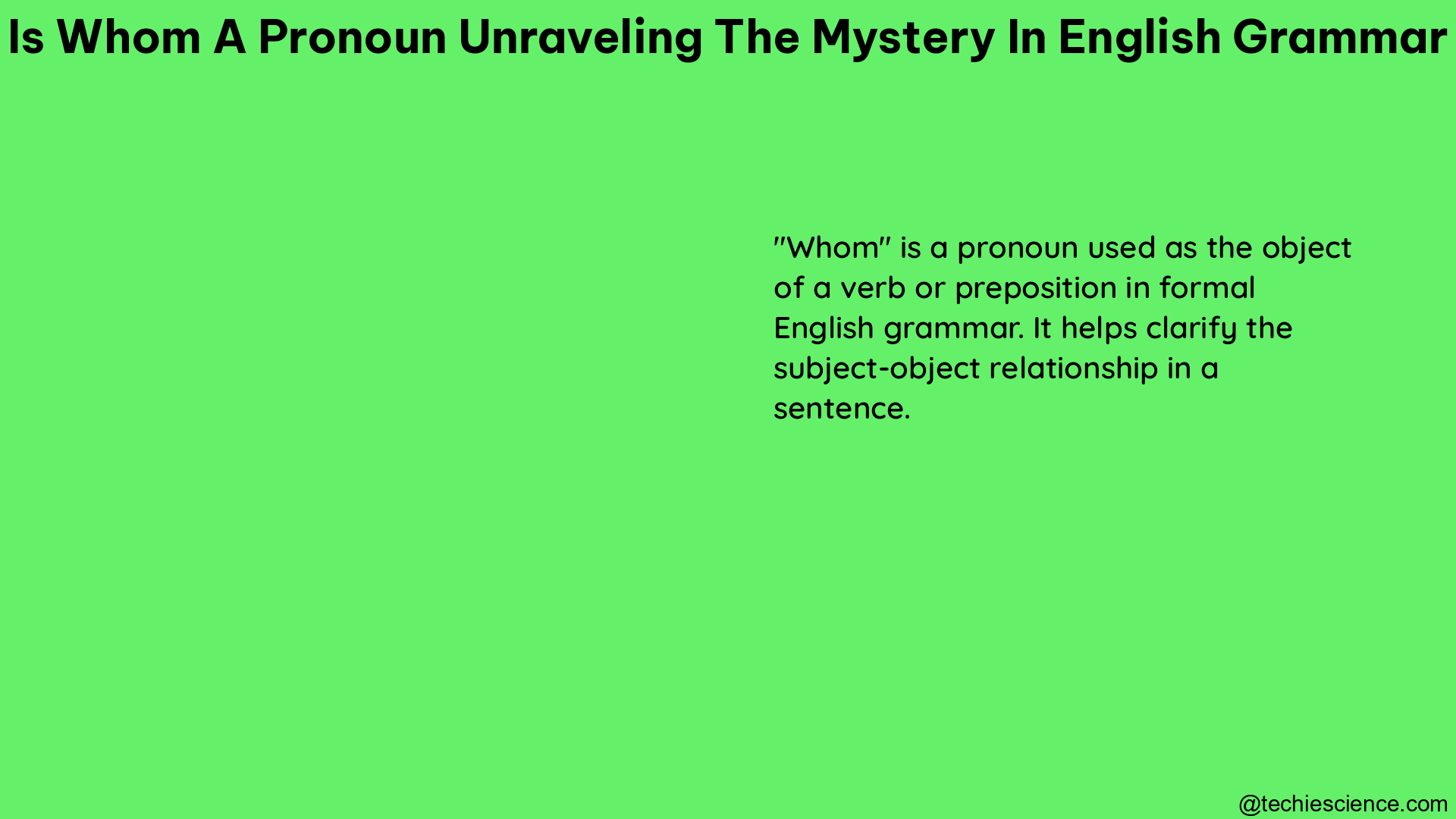“Whom” is a pronoun that plays a crucial role in linking clauses and indicating the object of verbs or prepositions in the English language. However, its usage can often be a source of confusion for many learners and writers. In this comprehensive guide, we will delve into the intricacies of “whom,” its functions, and how to distinguish it from other pronouns like “who.”
Understanding the Grammatical Role of “Whom”
As a relative pronoun, “whom” serves to connect clauses or phrases to a noun or pronoun, providing additional information. Its primary functions are:
- Object of a Verb or Preposition:
- “Whom” is used as the object of a verb or preposition, indicating the person or people affected by the action.
- Example: “The man whom I spoke to last night.”
-
In this sentence, “whom” is the object of the verb “spoke to.”
-
Linking Clauses:
- “Whom” can connect clauses or phrases to a noun or pronoun, adding more details.
- Example: “The woman whom he loved has gone away.”
- Here, “whom” links the clause “he loved” to the noun “woman.”
Distinguishing “Who” and “Whom”

One of the most common sources of confusion in English grammar is the distinction between “who” and “whom.” Understanding the difference in their grammatical roles is crucial for proper usage.
- Who:
- “Who” is used as the subject of a sentence or clause, indicating the person performing the action.
- Example: “The woman who volunteered to oversee the festival is experienced in event marketing.”
-
In this sentence, “who” is the subject of the verb “volunteered.”
-
Whom:
- “Whom” is used as the object of a verb or preposition, indicating the person affected by the action.
- Example: “He was the man to whom I spoke last night.”
- Here, “whom” is the object of the verb “spoke to.”
Applying the “He/Him” and “She/Her” Test
To determine whether to use “who” or “whom,” you can apply a simple substitution test using the personal pronouns “he/him” or “she/her.” If “he” or “she” is the correct substitution, use “who.” If “him” or “her” is appropriate, use “whom.”
- Example: “Sawyer is the man with whom I play golf every Saturday.” (I play golf with him.)
- Example: “The analysts differed as to who they thought might win.” (They differed on whether she might win.)
Identifying “Whom” in Complex Sentences
In more complex sentences, the usage of “whom” can become even more nuanced. Here are some additional guidelines to help you navigate these situations:
- Prepositional Phrases:
- When “whom” is used in a prepositional phrase, it is often the object of the preposition.
-
Example: “The person to whom I gave the book is my neighbor.”
-
Indirect Objects:
- “Whom” can also be used as the indirect object of a verb, indicating the recipient of the action.
-
Example: “The teacher to whom I submitted the assignment was impressed with my work.”
-
Compound Sentences:
- In compound sentences with multiple clauses, “whom” may be used to connect the clauses.
-
Example: “The candidate whom the voters elected is now the new mayor, and whom they trust to lead the city.”
-
Relative Clauses:
- “Whom” is often used in relative clauses to provide additional information about a noun or pronoun.
- Example: “The student whom the professor praised for her excellent research is applying for a prestigious scholarship.”
Mastering the Usage of “Whom”
Proficiently using “whom” in your writing requires practice and a deep understanding of its grammatical function. Here are some additional tips to help you master the usage of this pronoun:
-
Pay Attention to Sentence Structure: Carefully analyze the structure of the sentence to determine whether “who” or “whom” is the appropriate choice.
-
Consult Reference Materials: Utilize grammar guides, style manuals, and online resources to reinforce your understanding of “who” and “whom” usage.
-
Practice, Practice, Practice: Regularly incorporate “who” and “whom” into your writing, and seek feedback from experienced writers or editors to refine your skills.
-
Be Mindful of Formal vs. Informal Contexts: In more formal or academic writing, the use of “whom” is generally preferred, while in casual or conversational settings, “who” may be more commonly used.
-
Recognize Exceptions and Evolving Usage: While the traditional rules for “who” and “whom” still hold, some language experts argue that the distinction is becoming less rigid in modern English usage.
By understanding the grammatical role of “whom,” mastering the distinction between “who” and “whom,” and applying the appropriate techniques, you can confidently navigate the complexities of this pronoun and enhance the clarity and precision of your written communication.
References:
- https://iasce.net/decoding-grammar-pronoun-english/
- https://www.wordstrivia.com/grammar/grammar-mysteries-unraveled-decoding-the-secrets-of-language-structure
- https://www.youtube.com/watch?v=ZtJUON5kd4I
- https://kc-communications.com/solving-whowhom-mystery/
- https://www.youtube.com/watch?v=kRTwzkQuEK0

The lambdageeks.com Core SME Team is a group of experienced subject matter experts from diverse scientific and technical fields including Physics, Chemistry, Technology,Electronics & Electrical Engineering, Automotive, Mechanical Engineering. Our team collaborates to create high-quality, well-researched articles on a wide range of science and technology topics for the lambdageeks.com website.
All Our Senior SME are having more than 7 Years of experience in the respective fields . They are either Working Industry Professionals or assocaited With different Universities. Refer Our Authors Page to get to know About our Core SMEs.